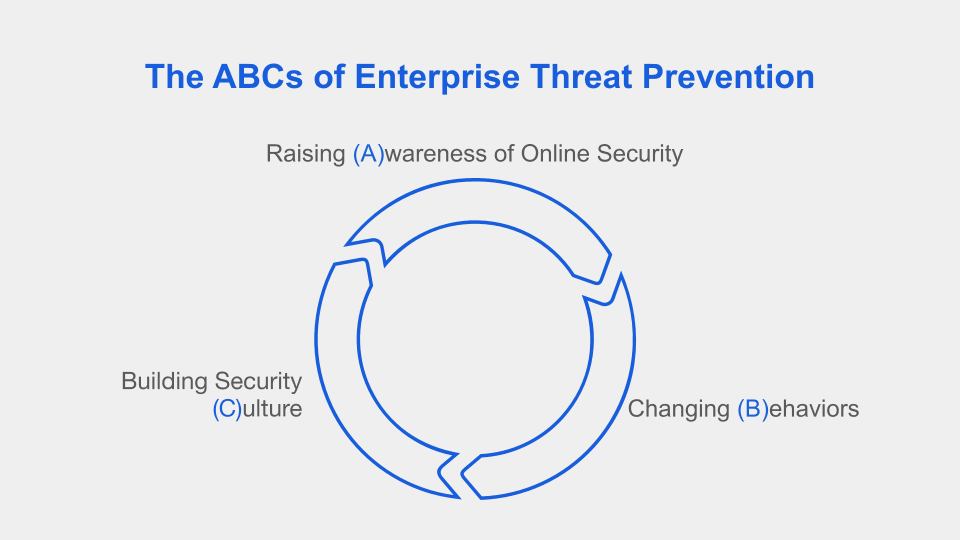Why Employees are the Front Line of Enterprise Threat Prevention
- Blog
- Why Employees are the Front Line of Enterprise Threat Prevention
Employees hold the power to strengthen enterprise threat prevention programs. They frequently recognize and raise potential security issues first, such as receiving a phishing scam email and immediately alerting IT and others to reduce damage. However, this level of proactiveness takes time to build as employees learn how to spot potential threats.
IT leaders recognize this and invest heavily in security awareness training to bolster risk mitigation. But training is just one element reinforcing best practices, and often more is needed.
Most companies maintain security awareness training or policies and handle a constant barrage of daily cyber threats. Recent data breaches show remarkable similarities between causes, namely hacked accounts, misconfigurations, and poor security.
These issues stem from actions like somebody failing to secure account access properly, disclosing login credentials to malicious parties, deploying a misconfigured resource, or leaving gaps in network security. Security awareness training helps to improve some of these behaviors but doesn’t account for the rapid evolution of cyber threats.
Security awareness training provides a snapshot of past issues, but threat actors constantly improve their operations, making training program material quickly outdated. For example, understanding the difference between HTTP and HTTPS protocols is no longer relevant due to the volume of threat actors hiding malware and phishing sites under HTTPS (SSL) certificates.
Research suggests some employees don’t immediately connect security as part of their daily responsibilities. Unfortunately, employees feel they have little control over security and, in some cases, that it causes friction to get their job done.
Translating employee awareness of security best practices into real-world action helps enterprises resolve this disconnect. While training still has a role in enterprise threat prevention, enterprises need to build on employee awareness to change behaviors and develop a culture of security. This process of raising Awareness (“A”), changing Behaviors (“B”), and creating a Culture of security (“C”) is effectively the ABCs of enterprise threat prevention.

The ABCs of enterprise threat protection create a virtuous circle where improvements in one area flow into the next. For example, raising awareness of online security sets the foundation for changing behaviors. Changing behaviors helps develop a culture of security, which then naturally advances employee awareness.
When given the right tools and guidance, employees can drive their own enterprise threat prevention programs. Many companies believe that offering a password manager can help. With access to a password manager, individual users become responsible for creating and storing their own credentials, helping reduce the risk of hacks and breaches impacting the enterprise.
You might also like: A Guide to Enterprise Password Management Throughout the Employee Lifecycle
Employees can use a password manager to create and store passwords, add identities, cards, and secure notes, both in a personal vault and organization vault for sensitive business data. Managers and administrators can allocate shared passwords, with every bit of vault data encrypted upon entry, at rest, and in transit. Reporting features reveal any weak or reused passwords, along with other helpful data security metrics.
Password managers further encourage positive change in behaviors. For example:
Browser plug-ins won’t show log-in credentials on a spoofed or phishing website
Vault timeout options prevent employees from leaving their vaults open when they are away from their workstations
Vault data synchronizes across all devices and platforms, reminding employees of credential security best practices at all times
Every element of the Bitwarden password manager supports enterprise threat prevention by empowering individual users to take responsibility for credential security. Employees will see security as something they can help control in both their personal and business lives.
Try Bitwarden yourself for free or start an Enterprise free trial.